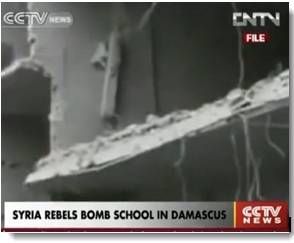CCTV by CCTV video image grab
The survival of the Syrian government represents a major failure of the empire project to recolonize and dominate energy rich Middle Eastern and North African states.
In an abrupt change from months of anticipatory triumphalism, French Foreign Minister Laurent Fabius admitted that Syrian President Bashar Assad will not be leaving power any time soon. This is a radical departure from the NATO script and that of their stenographers in the corporate media. We've been fed a mix of articles over the past months predicting Assad's imminent demise, filled with speculation on how post-Assad Syria will look after he's gone. (Image)
Reuters reported the Fabius remarks on January 24:
"Things are not moving. The solution that we had hoped for, and by that I mean the fall of Bashar and the arrival of the [opposition] coalition to power, has not happened."
How quickly "things" have changed. In a July 2012 fit of grandiosity, Fabius announced that "Bashar Assad does not deserve to be on the face of the planet."
While not as bombastic as her French counterpart, United States Secretary of State Hillary Clinton has been demanding for months that the Syrian president step down . When she pledged $12 million in U.S. support for the rebel cause in April 2012, Clinton said: "We think Assad must go. The sooner the better for everyone concerned."
After the successful take over in Libya, it looked like NATO's plan would work its horrific magic once again. I outlined the Libyan formula that seemed destined for Syria on August 8, 2012 (What if the Empire Project Fails in Syria):
1. Take advantage of a political clash between a used up/undesirable leader and some internal faction (the rebels);
2. Covertly arm and otherwise assist the rebels;
3. Get a UN resolution decrying human rights violations based on evidence from an NGO aligned with the rebels ;
4. Overtly arm and otherwise assist the rebels; and,
5. Win the battle for the rebels .
The NATO and Gulf states failed on points 3 and 5. There was no United Nations resolution for humanitarian intervention including the essential no-fly zone. Russia and China made sure that didn't happen with UN Security Council vetoes. Without UN cover, a coordinated NATO-rebel air and ground attack on the Syrian military remained just out of reach.
While the rebels did well for a period, they faced the reality of a well-armed opponent able to adjust to the ebb and flow of battle. After losing several key bases in the summer, Assad and his commanders reformulated their decision making, tactics, and personnel, according to Hassan Illeik writing in Alakhbar-English on January 8. According to Illeik, the changes worked well enough for both the Assad camp and an opposition insider to predict an endgame in which the rebels control only a portion of northern Syria and remain in continued conflict with the Syrian government.
Brian Downing outlined the very real possibility that the Syrian government could survive in early summer 2012 at a time when the mainstream media wouldn't even consider the idea. In previous articles, Downing anticipated the economic from Russia and China that provided staying power for Assad.
Now, we have the French admitting what apparently the Syrian government and rebels seem to believe and what the United States broadly hinted at when it declared the Syrian rebels most effective fighting unit, the Al Nusra Front, a terrorist organization (which it truly seems to be). The Empire Project in Syria is failing with no recovery in sight.
We have an intellectually and emotionally mature Secretary of State in place, John Kerry. He is not pounding the table demanding that any foreign leader leave office. Chuck Hagel will join the cabinet soon as Secretary of Defense, another public figure with a firsthand understanding of the costs and risks of war.
Soon, Syria may fade from public awareness in the United States, Great Britain, and France, the new colonialists. This forgetting is very much in the interests of those in charge since both the Libyan and Syrian interventions were opposed by large majorities in each country. But for those Syrians and Libyans who survive with injuries, who lost loved ones, or who experienced the unprovoked aggression of the NATO countries, attitudes have changed and memories will endure.
END
This article may be reposted with attribution of authorship and a link to this article.





